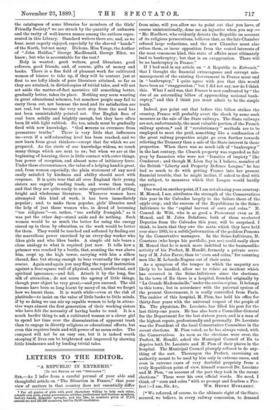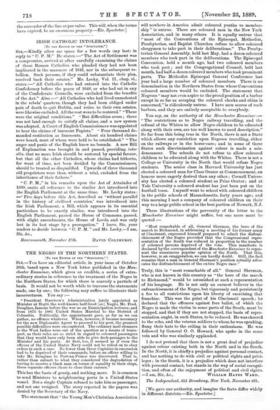LETTERS TO THE EDITOR.
-" A REPUBLIC IN EXTREMIS."
ITO THE EDITOR OF THE " SPECTILTOR.."3
SIR,—As I infer from a careful perusal of your able and thoughtful article on " The Situation in France," that your view of matters in that country does not essentially differ
• For all grades of girls with good characters willing to help each other, -schoolr oom girls, young governesses, artistes, professional and business members, factory -hands, domestic servants, and the like, to numbers given of 27,174 :assails tes and 121,268 members, besides 23',020 candidates.
from mine, will you allow me to point out that you have, of course unintentionally, done me an injustice when you say :— " Mr. Hurlbert, who evidently detests the Republic on account of its religions persecutions, believes that, as the late Chamber refused large reductions, and the new Chamber must also • refuse them, or incur opposition from the vested interests of the most venomous kind, this state of affairs must ultimately lead to bankruptcy; but that is an exaggeration. There will be no bankruptcy in France."
If I had said in my article on " A Republic in Extremis," that I thought the financial extravagance and corrupt mis- management of the existing Government in France must end in " bankruptcy," I quite agree with you that this would have been an " exaggeration ;" but I did not say, nor do I think this. What I said was, that France is now confronted by " the rise of an astounding billow of approaching national bank- ruptcy," and this I think you must admit to be the simple truth.
Indeed, you point out that before this billow strikes the country, France will probably avert the shock by some such measure as the sale of the State railways. The State railways are not, unfortunately, the most valuable portion of the French railway system,* and if " revolutionary " methods are to be employed to meet the peril, something like a confiscation of the great railway properties might go even further towards relieving the Treasury than a sale of the State interest in those properties. When there was so much talk of " bankruptcy " in the last century, the Church property was regarded as fair prey by financiers who were not "fanatics of impiety" like Condorcet ; and though M. Leon Say is, I believe, member of the British "Liberty and Property Defence League," he has had so much to do with getting France into her present financial trouble, that he might incline, if asked to deal with the subject, to measures which that League would hardly approve.
One word on another point, if I am not abusing your courtesy. M. Monod, I see, attributes the strength of the Conservatives
this year in the Calvados largely to the failure there of the apple crop; and the success of the Republicans in the Seine-
Inferieure to the "capital harvest of corn and colza." M. Conrad de Witt, who is as good a Protestant even as M. Monod, and M. Jules Delafosse, both of them re-elected Deputies from the Calvados this year, will be surprised, I think, to learn that they owe the seats, which they have held ever since 1885, to a subtle:subornation of the goddess Pomona by the Conservative managers. In the Seine-Inferieure, M. Constans (who keeps his portfolio, you see) could easily show M. Monod that he is much more indebted to the businesslike activity of his Prefect, M. Hendle, formerly a private secre- tary of M. Jules Favre, than to "corn and colza," for counting men like M. Leborde-Noguez out of their seats.
As a symptom of the temper in which the majority are likely to be handled, allow me to relate an incident which has occurred in the Seine-Inferieure since the elections. In the town of En there is a hospital, founded originally by " La Grande Mademoiselle," under the aneien regime. It belongs to this town ; but in accordance with the paternal system of the present Government, it is really controlled from Paris. The cashier of this hospital, M. Pion, has held his office for thirty-four years with the universal respect of the people of En. The physician, Dr. Lecointe, has filled his post for the last thirty-one years. He has also been a Councillor-General for the Department for the last sixteen years, and is a man of the highest repute, professionally and personally. Dr. Lecointe was the President of the local Conservative Committee in the recent elections. M. Pion voted, as he has always voted, with the Conservatives. As soon as the elections were over, the Prefect, M. Hendle, asked the Municipal Council of En to deprive both Dr. Lecointe and M. Pion of their places in the hospital. The Municipal Council plumply refused to do any- thing of the sort. Thereupon the Prefect, exercising an authority meant to be used by him only in extreme cases, and even in extreme cases of very doubtful propriety from a truly Republican point of view, himself removed Dr. Lecointe and M. Pion, " on account of the part they took in the recent elections." These were his own official words. No need, I think, of "corn and colza " with so prompt and fearless a Pre-
[* We referred, of course, to the ultimate right of the State, secured, we believe, in every railway concession, to demand the surrender of the line at par value. This will, when the terms have expired, be an enormous property.—ED. Spectator.]







































 Previous page
Previous page